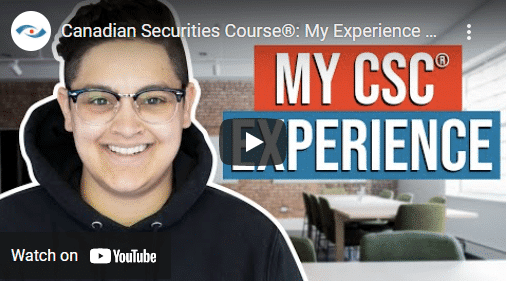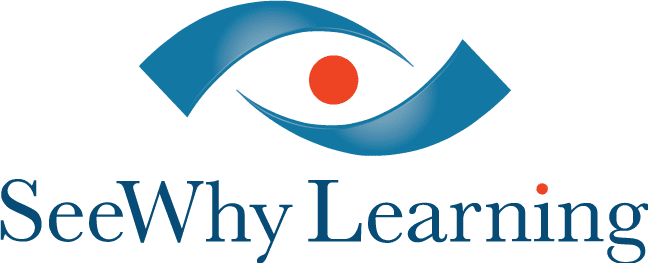An important CSC study tip is to ‘take advantage of the power of repetition’, and do a brain dump.
Hey, everyone. Today I’m going to talk about my experience as a student taking the Canadian Securities Course. I’m going to run through a number of different topics related to taking the course and passing the exam, such as my background, why I took the course, how long it took me to study, study tips, some exam tips, and then ultimately, what I learned from taking the course.
So first I’m going to talk about my background a little bit. I do work for SeeWhy Learning but I have no financial background whatsoever. I have a degree in Media Arts, I am the Marketing & Multimedia Specialist at SeeWhy Learning, and I have no background in this. The last time I took anything even remotely related to this course was in high school economics. I was pretty intimidated walking in and seeing that I had to learn two textbooks worth of content related to concepts that I had no understanding of.
Even further, I was intimidated by the fact that there will be math in this course because, admittedly, I am not very good at math. I even opted out of taking any sort of math as much as I could in school, and I was a bit worried about the amount of math in the course, but there really isn’t that much and you are allowed to use a calculator on the exam – that made it a lot better.
All of this is to say that if you are someone who has no background in the content, you can pass the course because I did! Yeah, it was a little bit tough, but I was able to do it with absolutely no prior knowledge. If you do have prior knowledge it is going to make the course a lot easier, but there are still some things you can learn from taking the course.
The reason I took the exam is because when I started working at SeeWhy, the company wanted me to have the experience our students have when they go through the study and exam taking process. On top of that, it was useful for me to have some base knowledge of the concepts that SeeWhy is teaching the students and the things I’m ultimately going to be marketing. By taking the exam, I definitely did get the ‘student experience’ because I had to study like anyone else. Yes, I had access to the SeeWhy study tools, but I had no leg up over anyone else.
I’m going to start off by talking about how long it took me to study. For my 1st exam, I think I studied for about 4 or 5 weeks and then wrote the exam. I did study a little bit before that 4-5 week chunk, but the things I learned in the time before that, I didn’t really remember. So most of my studying, I would say 99% of it, came in that 4-5 week block. That was more than enough time for me to study everything and pass the exam while studying part-time because I was working full-time.
When you sign up for the CSC, they give you a year to write the two exams and that’s clearly more than enough time if you can pass each exam within 4-5 weeks. For the 2nd exam, I did things a little bit differently. I really just wanted to get it out of the way and my window of opportunity to write it was starting to close, so I booked it for a closer date than I did with the previous exam and I condensed my studying down to just a couple of weeks.
I did pass that exam as well, but I found it to be a really tough and stressful experience, so I definitely wouldn’t recommend that you do that. I would if you are studying full time, but if you are studying part-time like I did, then I would definitely recommend that you stick with the 4-5 week study schedule.
I did use the SeeWhy study schedule, and found that to be extremely helpful because it lays out exactly what you need to do on each day and it gives you a sense for how far along you are in your learning. If you do miss something, you can just look back and say “Okay … I didn’t study on Tuesday, I didn’t study on Wednesday, so now the weekend I’m going to have to study for two more extra days”. I just found the study schedule really kept me on track and gave me a sense for where I was at before I walked into the exam.
In terms of my studying itself, I did use the SeeWhy tools, as I mentioned before, and honestly, I did find them to be extremely helpful, especially as someone with no prior knowledge of any of these concepts. I found the study guide to be extremely helpful because it really does teach all the concepts in plain simple English and it uses a lot of analogies and memory aids and things like that to really illustrate the concepts and help you to remember them.
I found the CSC course textbook to be a little bit more challenging, especially for me with my media arts background. I found some of the wording to be confusing and a little bit difficult to comprehend. However, the Study Guide doesn’t cover everything that’s in the course textbook. If you want to get a really high mark on the exam like a 95% or 100%, you definitely need to read the textbook as well. The Study Guide doesn’t cover everything, it only covers the most important stuff that you need to know and the things that you will need to pass the exam. So it’s definitely important to read both and use both tools, but they do have their pros and cons.
The other tools that SeeWhy offers, the Flash Cards and the Videos and the Practice Questions, were also super helpful. I found especially that the Practice Questions were very helpful because for the CSC, there’s hundreds of them. They really help you apply your learning and they give you a sense for where you’re at. When you take the Quizzes, you can say “Okay, I got 60% on this, I need to study this chapter a bit more”.
The other thing is when you get a question wrong when you’re doing the Practice Exams, it doesn’t just tell you that you got it wrong, it tells you why you got it wrong in the answer key. It will say “Oh, you got this question wrong and here’s why”, which is also a very helpful learning experience. Hopefully when you come through the next time, you’ll get that question right.
The most important study tip I can offer you is to ‘take advantage of the power of repetition’. A lot of these concepts are tricky and difficult to remember, so I found that repetition was really important in helping me remember things. For example, I’d read the Study Guide, then I’d do the Flash Cards, then I’d do the Practice Questions, and that gives me three different times that I looked at the same chapter or content, and that really helps cement it into my brain. Looking at the same content as many times as possible, and in as many different ways as possible, is the best way to help you understand and remember it.
My biggest tip for the exam itself is to do a ‘brain dump’. What that means is when there’s a tricky concept that you’re learning in a particular chapter, and you’re not sure if you’re going to remember it, what you do is when you go into the exam and the proctor says you’re allowed to begin, then you write that stuff out right away and just get it out of your brain and onto the page so that when you do come to a question about it, you can just refer back.
For example, something that I found really difficult to remember was the ‘call/put table’. So before I went to the exam, I made sure that I really memorized it and was able to write it down, and then once I got in the exam and I was allowed to start, I just went ahead and wrote that down immediately and got it out of the way. Then I went through the rest of the exam, answered the questions, and then when I came up to the questions about Derivatives, I was able to just refer back to the ‘call/put table’ I had already written down and not have to worry about trying to remember it after answering a bunch of questions. It was a lot easier to write it down at the beginning when it was fresh and just get it out of the way.
Ultimately, I did learn a lot from taking this course. Of course, I learned what it was like to be a student and go through the entire exam writing process, but I also learned a lot of things I would have never learned otherwise. I would definitely recommend this course to anyone that needs it for their career, of course, but even if you don’t need it, it’s something that can really help you learn a lot of things that could be useful in your personal life.
For example, I had no knowledge of Securities before this, but now that I do know, I’m able to manage my own investments a little bit easier instead of having to rely on Internet sources like articles or YouTube that may not be so reliable. I already have a solid foundation upon which I can build more knowledge.
Thanks for watching this video. I hope that was helpful and gave you a sense of what it’s like to write the CSC and the entire process of taking the course and writing exam. If you have any questions, please send a comment to SeeWhy Learning and we’ll do our best to answer them for you. Good luck on your exams!

Recent Videos

Monetary & Fiscal Policy Part 2

Monetary & Fiscal Policy






